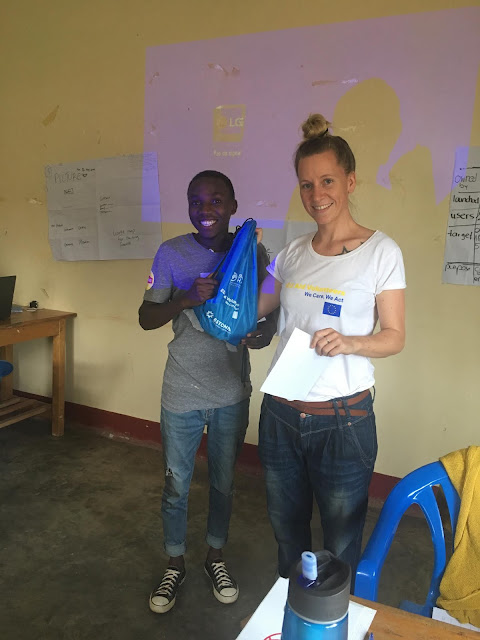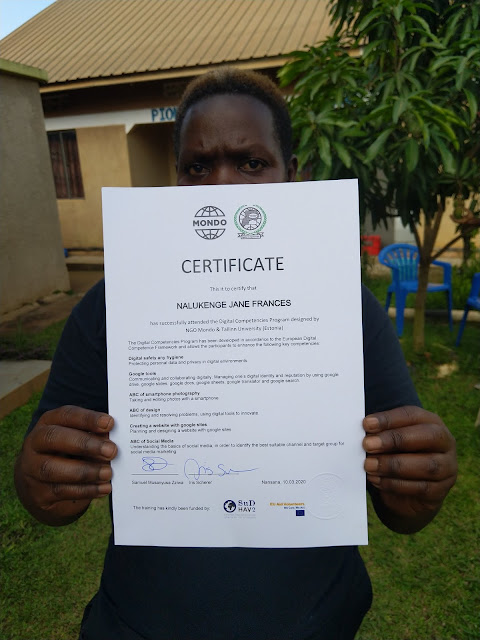Since 10 days I am back from Uganda. Due to the Corona outbreak, I am stranded in Germany and cannot yet return to my adopted home - Portugal.
This is going to be my second last article. The title is similar, but it is a whole new story. This is a reverse culture shock.
It is very hard to explain to my friends and family about reverse culture shock. Many of them never lived abroad. And only a few of the ones that did, experienced the harsh conditions of a developing country.
Reverse culture shock is nothing new. It happens to many people that come back from an experience abroad. It does not even need to be a developing context.
 |
The W Curve illustrates the ups and downs of culture shock (source: interexchange.com) |
But still, people around me don't understand. They say things like: Germany is your home, how can it be a "shock" to come back?
Maybe they forget that I haven't lived in Germany since 2016? Germany has not been home for a while.
And how can they understand that the difference between Uganda and Germany could not be any bigger?
And how can they understand that the difference between Uganda and Germany could not be any bigger?
People around me don't understand and can't relate to things I talk about. Or understand my thoughts. Some are not interested in what I'm thinking either. My experiences are too abstract to follow.
I feel people ask the wrong questions, make the wrong comments. I get frustrated.
I feel people ask the wrong questions, make the wrong comments. I get frustrated.
The inconveniences of a developing country
- The past six months I showered with cold water, I got used to power cuts and lack of internet.
- I learned to survive in the crowded and polluted streets of Nansana and Kampala.
- We had to filter the water we drank and boil the water we brushed our teeth with.
 |
| Perfect water filter, to go! |
- The selection of food was limited and banana was the main element of our diet. Sometimes I lived with two meals per day, and food was not always very nutritious. I lost 4 kg while I was there.
- The temperatures were warm, we never had less than 18 ° Celcius. I learned to deal with the rain and how life stops when the streets get flooded.
- I had to bargain for prices at the market, for public transport, for clothes, basically for most the things.
- I got used to overcrowded busses that don't follow any timetable but come whenever they feel it is appropriate.
- I washed my clothes by hand, in cold water.
 |
| Handwash. With soap and cold water |
- I saw malnourished children, spoke to women that had been raped.
- I worked with people that had to flee their country and experienced violence we cannot even imagine.
- I was surrounded by people with HIV/ AIDS and met people that could not afford medicine that cost not even 0,25 Euro.
- Some people in my neighborhood earned 40 Euro per month and had to feed a whole family. Many struggle to pay school fees because, despite severe poverty, education is not for free.
- I visited children that were neglected by their parents.
 |
| Visiting kids that were left by their mum |
And yet! I saw a lot of happiness. I was surrounded by children. I heard laughter and saw children playing in the streets every day when I came home from work. People smiled and greeted. Everyone was always curious to talk.
Most of the people were happy with the little they had. And yet, it goes without saying that everything is shared in Uganda.
 |
| My friends from the neighborhood, always up for a game. |
It took me quite a while to adapt and understand the different contexts in Uganda. Sometimes I was overwhelmed by all the impressions and differences.
But one thing is for sure: I felt ALIVE and work felt meaningful sometimes.
But one thing is for sure: I felt ALIVE and work felt meaningful sometimes.
Coming back to first world problems
Now I am back in Germany. I have a hot shower, I can drink water from the tap. Our fridge us full and my mum doesn't stop feeding me, serving me 5 meals per day. I know she means well but she is sometimes overwhelming me with her care.
The roads here are in amazing condition.
People worry about the perfect shape of a cake, about toilet paper and changing the clock.
There are 30 different kinds of cheese. Actually, I don't even care which one I eat, I am just happy to have cheese at all.
Life is much more comfortable and yet I have moments when I am overwhelmed by a deep sadness.
It feels like I live in a bubble.
The roads here are in amazing condition.
People worry about the perfect shape of a cake, about toilet paper and changing the clock.
There are 30 different kinds of cheese. Actually, I don't even care which one I eat, I am just happy to have cheese at all.
Life is much more comfortable and yet I have moments when I am overwhelmed by a deep sadness.
It feels like I live in a bubble.
How to overcome a reverse culture shock in a Pandemic?
There are a lot of recommendations on how to overcome reverse culture shock, such as:
- Keep busy
- Share your experience
- Connect and network
But how can I keep busy if Corona locks me in the house? How can I share my experience if everyone is only worried about the virus? How can I connect and network with friends, when everyone is isolated?
And I know: Germany is only a temporary destination and I hope I will be able to return to Portugal soon, to the comfort of the ocean, which feels a little bit more home. Then reintegration can begin!
Lost in transit
Times ain't easy at the moment, for nobody. I have to be patient with myself, my friends and family and people around me. I hope they are patient with me too.And I know: Germany is only a temporary destination and I hope I will be able to return to Portugal soon, to the comfort of the ocean, which feels a little bit more home. Then reintegration can begin!























